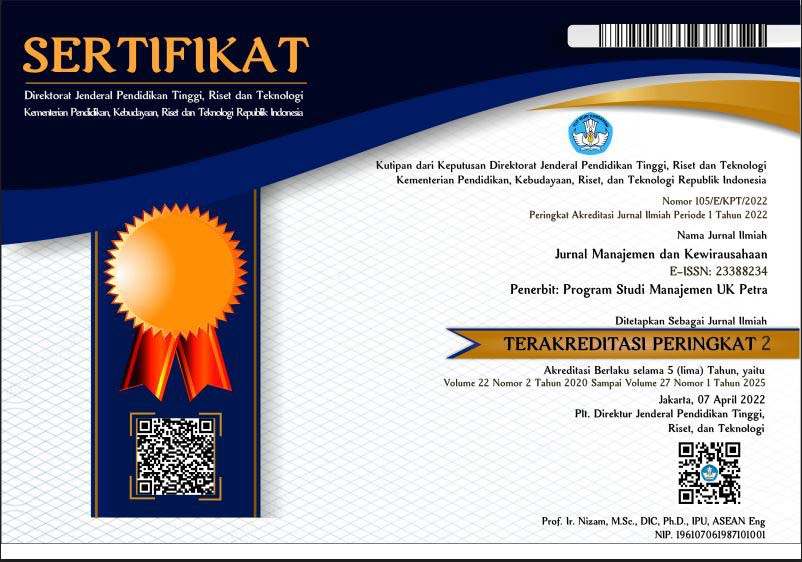ENTREPRENEURIAL ATTITUDE AND STUDENTS BUSINESS START-UP INTENTION: A PARTIAL LEAST SQUARE MODELING
 :
:
https://doi.org/10.9744/jmk.19.1.46-53
Keywords:
Start-up business, intention, spirit, entrepreneurial.Abstract
This article is designed to examine the role of the entrepreneurial spirit, education and in building an attitude about working as an entrepreneur, and his influence on the intention to start a business, to the students. Data were collected using a questionnaire has been prepared and maintained the validity and reliability. Questionnaires given to the respondent students were selected as samples at several universities in Malang, East Java, Indonesia. The collected data were analyzed by using Partial Least Square. The analysis showed entrepreneurial spirit and education contribute to the formation of entrepreneurial attitudes. Attitudes are formed encourage entrepreneurship intentions to start a business significantly.
References
Ahmed, I., Nawaz, M.M., Ahmad, Z., Shauka, M.Z., Usman, A., Wasimul Rehman, & Ahmed, N. (2010). Determinants of students’ entrepreneurial career intentions: Evidence from business graduates. [CrossRef]
Aizzat, N.M., Noor, A.H., & Chew, L.E. (2009). Examining a model of entrepreneurial intention among Malaysians using SEM procedure. Europen Journal of Scientific Research, 33(2), 10. [CrossRef]
Ajzen, I. (1991). The theory of planned behavior. Organizational Behavior and Human Decision Processes, 50(2), 179–211. doi: 10.1016/0749-5978(91)90020-t. [CrossRef]
----------- (2011). The theory of planned behavior: Reactions and reflections. Psychol Health, 26(9), 1113–1127. doi: 10.1080/08870446.2011.613995. [CrossRef]
Akanbi, S.T. (2013). Familial factors, personality traits and selfefficacy as determinants of entrepreneurial intention among vocational based college of education students in Oyo State, Nigeria. An online journal of the African Educational Research Network, 13(2). [CrossRef]
Alain, F., Benoît, G., & Narjisse, L. C. (2006). Effect and countereffect of entrepreneurship education and social context on student’s intentions. E- STUDIOS DE E CONOMÍA A PLICADA, 24(2), 14. [CrossRef]
Alhaji, A. (2015). Entrepreneurship education and its impact on selfemployment intention and entrepreneurial selfefficacy. Humanities and Social Sciences, 3(1), 6. doi: 10.11648/j.hss.20150301. 17. [CrossRef]
Alsos, G. A., Isaksen, E. J., & Softing, E. (2006). Youth enterprise experience and business startup intentions. 14th Nordic Conference on Small Business Research. Stockholm, 11–13 May 2006. [CrossRef]
Ariff, A. H. M., Bidin, Z., Sharif, Z., & Ahmad, A. (2010). Predicting entrepreneurship intention among Malay university accounting students in Malaysia. UNITAR E-JOURNAL, 6(1). [CrossRef]
Armitage, C. J. & Conner, M. (2001). Efficacy of the theory of planned behaviour: A meta-analytic review. British Journal of Social Psychology, 40, 471–499. [CrossRef]
Baumol, W. J. (2007). Entrepreneurship and innovation:Tthe (micro) theory of price and profit. [CrossRef]
Bergmann, H., Hundt, C., & Sternberg, R. (2016). What makes student entrepreneurs? On the relevance (and irrelevance) of the university and the regional context for student start-ups. Small Business Economics, 47(1), 53–76. doi: 10.1007/ s11187-016-9700-6. [CrossRef]
Bula, H. O. (2012). Evolution and theories of entre-preneurship: A critical review on the Kenyan perspective. International Journal of Business and Commerce, 1(11). [CrossRef]
Bull, I., & Willard, G. E. (1995). Towards a theory of entrepreneurship. Journal of Business Venturing, 8(12). [CrossRef]
Byabashaija, W., Katono, I., & Isabalija, R. (2010a). The impact of college entrepreneurial education on entrepreneurial attitudes and intention to start a business in Uganda. Proceedings. [CrossRef]
------------ (2010b). The impact of college entrepreneurial education on entrepreneurial attitudes and intention to start a business in Uganda. Entrepreneurship in Africa Conference. [CrossRef]
Cameron, R., Ginsburg, H., Westhoff, M., & Mendez, R. V. (2012). Ajzen’s theory of planned behavior and social media use by college students. American Journal of Psychological Research, 8(1). [CrossRef]
Chen, S. C., Jing, L. L., & Sung, M. H. (2012). University students’ personality traits and entrepre-neurial intention: Using entrepreneurship and entrepreneurial attitude as mediating variable. International Journal of Economics and Mana-gement, 3(3), 76. [CrossRef]
Corner, M. & Armotage, C. (1998). Extending the theory of planned behavior; A review and avenues for futher research. [CrossRef]
Douglas, E. J. (2013). Reconstructing entrepreneurial intentions to identify predisposition for growth. Journal of Business Venturing, 28, 27. doi: 10.1016/j.jbusvent.2012.07.005. [CrossRef]
Fayolle, A. & Gailly, B. (2015). The impact of entrepreneurship education on entrepreneurial attitudes and intention: Hysteresis and persistence. Journal of Small Business Management, 53(1), 18. doi: 10.1111/jsbm.12065. [CrossRef]
Fini, R., Grimaldi, R., Marzocchi, G. L., & Sobrero, M. (2009). The foundation of entrepreneurial intenti-on. [CrossRef]
Fitzsimmons, J. R. & Douglas, E. (2005). The impact of overconfidence on entrepreneurial intentions. In Proceedings AGSE Entrepreneurship Ex-change. [CrossRef]
Fitzsimmons, J. R. & Douglas, E. J. (2005). Entrepreneurial attitudes and entrepreneurial intentions: A crosscultural study of potential entre-preneurs in India, China, Thailand, and Australia. Babson Kauffman Entrepreneurial Research Conference. [CrossRef]
Galor, O. & Michalopoulos, S. (2009). The evolution of entrepreneurial spirit and the process of deve-lopment. Working Paper, 111. [CrossRef]
Gelderen, M. V., Brand, M., Praag, M. V., Bodewes, W., Poutsma, E., & Gils, A. V. (2008). Explain-ing entrepreneurial intentions by means of the theory of planned behaviour. doi: 10.1108/ 13620430810901688. [CrossRef]
Gelderen, M. V., Kautonen, T., & Fink, M. (2015). From entrepreneurial intentions to actions: Selfcontrol and actionrelated doubt, fear, and aversion. Journal of Business Venturing, 30(28). doi: 10.1 016/j.jbusvent.2015.01.003. [CrossRef]
Harris, M., Gibson, S., & Mick, T. (2009). A connection between personality and entrepreneurial atti-tudes: Evidence from U.S. Business Students, 1. [CrossRef]
Hattab, H. W. (2014). Impact of entrepreneurship education on entrepreneurial intentions of university students in Egypt. The Journal of Entre-preneurship, 23(1), 18. doi: 10.1177/097135571 3513346. [CrossRef]
Holst, A. & Iversen, J. M. (2011). An application of a revised theory of planned behavior: Predicting the intention to use personal care products without endocrine disrupting chemicals. [CrossRef]
Izedonmi, P. F. & Okafor, C. (2010). The effect of entrepreneurship education on students’ entrepre-neurial intentions. Global Journal of Management and Business Research, 10(6). [CrossRef]
Kautonen, T., Van Gelderen, M., & Fink, M. (2015). Robustness of the theory of planned behavior in predicting entrepreneurial intentions and actions. Entrepreneurship Theory and Practice, 39(3), 655–674. doi: 10.1111/etap.12056. [CrossRef]
Khuong, M. N. & An, N. H. (2016). The factors affecting entrepreneurial intention of the students of Vietnam national university: A mediation analysis of perception toward entrepreneurship. Journal of Economics, Business, and Management, 4(2), 7. doi: 10.7763/JOEBM.2016.V4. 375. [CrossRef]
Klucznik-Törö, A. (2014). Results of the systematic literature review on entrepreneurship and its influencing factors. Forum Scientiae Oeconomia, 2(1). [CrossRef]
Krueger, N. F., Reilly, M. D., & Carsrud, A. L. (2000). Competing models of entrepreneurial intentions. Journal of Business Venturing, 15, 12. [CrossRef]
Lekhanya, L. M. (2016). Critical analysis of entrepreneurial spirit, attitudes, and perceptions of young South Africans in KwaZulu-Natal province. Problems and Perspectives in Management, 14(3). [CrossRef]
Li, W. (2007). Ethnic entrepreneurship: Studying Chinese and Indian students in the United States. Journal of Developmental Entrepreneurship, 12(4), 17. doi: 10.1142/S1084946707000769. [CrossRef]
Michael, H. & Shanan, G. (2009). A connection between personality and entrepreneurial attitude; Evidence from U.S business student. [CrossRef]
Miller, R. L. (2004). Toward a model of spiritual entrepreneurship. [CrossRef]
Mueller, S. (2015). Social entrepreneurship education: Student values, attitudes, and intentions. [CrossRef]
Naudé, W. (2013). Entrepreneurship and economic development: Theory, evidence and policy. [CrossRef]
Ngugi, K. (2014). Intellectual capital theory of entrepreneurship. European Journal of Business Management, 2(1). [CrossRef]
Okpara, F. O. (2007). The value of creativity and innovation in entrepreneurship. Journal of Asia Entrepreneurship and Sustainability, III(2). [CrossRef]
Oosterbeek, H., Van Praag, M. C., & Ijsselstein, A. (2008). The impact of entrepreneurship education on entrepreneurship competencies and intentions: An evaluation of the junior achieve-ment student mini-company program. [CrossRef]
Paço, A. D., Ferreira, J. M., Raposo, M., Rodrigues, R. G., & Dinis, A. (2015a). Entrepreneurial intentions: Is education enough? International Entrepreneurship and Management Journal, 11(1), 22. [CrossRef]
--------------. (2015b). Entrepreneurial intentions: Is education enough? International Entrepreneurship and Management Journal, 11(1), 8. [CrossRef]
Qosja, E. & Druga, E. (2015). Entrepreneurial spirit and factors affecting it: Case study based on the students of the European university of Tirana. Internationl Journal Of Social Science dan Edu-cation, 1(3). [CrossRef]
Rantanena, T. & Toikkob, T. (2013). Social values, societal entrepreneurship attitudes and entrepreneurial intention of young people in the Finnish welfare state. Poznań University of Economics Review, 13(1). [CrossRef]
Remeikiene, R., Startiene, G., & Dumciuviene, D. (2013). Explaining entrepreneurial intention of university students: The role of entrepreneurial education. [CrossRef]
Rengiah, P. (2016). The effectiveness of entrepreneurship education in developing entrepreneurial intentions among Malaysian university students: A research findings on the structural equation modeling. European Journal of Business and Social Sciences, 5(2). [CrossRef]
Rutherford, L. G. & DeVaney, S. A. (2004). Utilizing the theory of planned behavior to understand convenience use of credit cards. [CrossRef]
Segumpan, R. G. & Zahari, J. S. A. (2012). Attitude towards entrepreneurship among Omani college students trained in business. International Journal of Business and Behavioral Sciences, 2(4), 61–72. [CrossRef]
Sihombing, S. O. (2011). Comparing entrepreneurship intention: A multigroup structural equation modeling approach. International Research Journal of Busines Studies, 5(1), 14. [CrossRef]
Smith, J. R., Manstead, A. S. R., Terry, D. J., Louis, W. R., Kotterman, D., & Wolfs, J. (2007). Interaction effects in the theory of planned behavior: The interplay of self-identity and past behavior. Jour-nal of Applied Social Psychology, 37(11), 2726–2750. [CrossRef]
Sorin-George, T., Ana Maria, G., & Paul, M. (2014). Economic development and entrepreneurship. Procedia Economics and Finance, 8, 7. doi: 10.1016/s2212-5671(14)00111-7. [CrossRef]
Thyil, V. & Durden, G. (2006). What exactly is entre-preneurial spirit? A conceptual framework and empirical evidence. [CrossRef]
Tung, M., Ling, A. Y., & Ling, D. M. (2011). Young adult responses to entrepreneurial intent. International Refereed reseaerch Journal, 2(3), 15. [CrossRef]
Veciana, J. M., Aponte, M., & Urbano, D. (2005). University students’ attitudes towards entrepre-neurship: A two countries comparison. International Entrepreneurship and Management Journal 1, 17. [CrossRef]
Venesaar, U., Kolbre, E., & Piliste, T. (2010). Students’ attitudes and intentions toward entrepreneurship at Tallinn university of technology. [CrossRef]
Wilhelmina, S. & Tendai, C. (2014). Entrepreneurship, economic growth and entrepreneurship theories. Mediterranean Journal of Social Sciences. doi: 10.5901/mjss.2014.v5n14p160. [CrossRef]
Xiao, L. & Fan, M. (2012). Does social network always promote entrepreneurial intentions? part I: Theoretical model. [CrossRef]
Downloads
Published
How to Cite
Issue
Section
License
Authors who publish on this journal agree to the following terms:
- Authors retain copyright and grant the journal right of first publication with the work simultaneously licensed under a Creative Commons Attribution License that allows others to share the work with an acknowledgement of the work's authorship and initial publication in this journal.
- Authors are able to enter into separate, additional contractual arrangements for the non-exclusive distribution of the journal's published version of the work (e.g., post it to an institutional repository or publish it in a book), with an acknowledgement of its initial publication in this journal.
- Authors are permitted and encouraged to post their work online (e.g., in institutional repositories or on their website) prior to and during the submission process, as it can lead to productive exchanges, as well as earlier and greater citation of published work (See The Effect of Open Access).

















